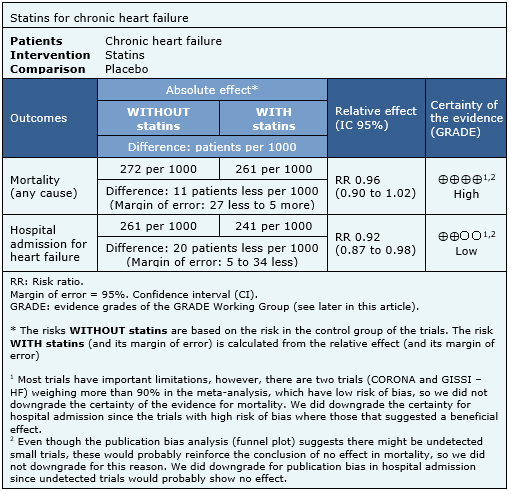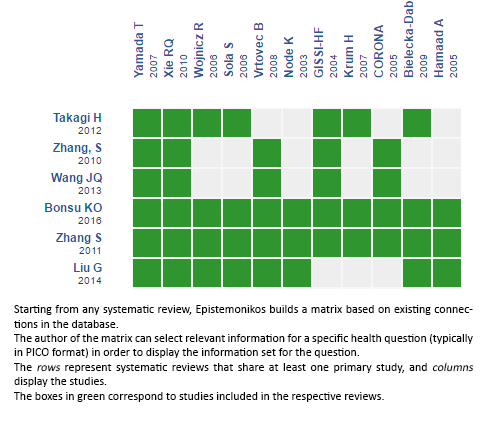Resúmenes Epistemonikos
← vista completaPublicado el 25 de abril de 2017 | http://doi.org/10.5867/medwave.2017.6853
¿Son beneficiosas las estatinas en insuficiencia cardíaca crónica? Primera actualización
Are statins beneficial for chronic heart failure? First update
Abstract
This Living FRISBEE (Living FRIendly Summary of the Body of Evidence using Epistemonikos) is an update of an article published in May 2015 (doi: 10.5867/medwave.2015.04.6140), based on the detection of nine new systematic reviews.
Even though statins decrease inflammatory markers and improve some echocardiographic parameters in heart failure, it is not clear whether they have an impact on clinically important outcomes. Searching in Epistemonikos database, which is maintained by screening multiple databases, we identified 14 systematic reviews including 25 randomized trials answering the question of interest. We extracted data, combined the evidence using meta-analysis and generated a summary of findings table following the GRADE approach. We concluded statins do not decrease mortality in chronic heart failure, and might lead to a small reduction in hospital admissions for heart failure, but the certainty of this evidence is low.
About the update
This Living FRISBEE (Living FRIendly Summary of the Body of Evidence using Epistemonikos) is an update of the summary published in May 2015 (doi: 10.5867/medwave.2015.04.6140), based on the detection of nine new systematic reviews.
The new evidence incorporated in this summary does not lead to changes in the certainty of the evidence, the estimates of the magnitude of effects, the key messages or the considerations for decision-making.
Problem
Apart from their main effects on serum lipid levels, statins would have pleiotropic properties, such as antihypertrophic, antifibrotic, antioxidant and inhibitor of neurohumoral activation, all of them involved in the pathophysiology of heart failure. Some studies have shown statins would improve ejection fraction and decrease inflammatory biomarkers, however it is not clear if these effects translate into a clinically important benefit.
Methods
We used Epistemonikos database, which is maintained by screening multiple databases, to identify systematic reviews and their included primary studies. With this information, we generated a structured summary using a pre-established format, which includes key messages, a summary of the body of evidence (presented as an evidence matrix in Epistemonikos), meta-analysis of the total of studies, a summary of findings table following the GRADE approach and a table of other considerations for decision-making.
|
Key messages
|
About the body of evidence for this question
|
What is the evidence. |
We found fifteen systematic reviews [1],[2],[3],[4],[5], This table and the summary in general are based on the latter. |
|
What types of patients were included |
The trials included patients with heart failure from any cause receiving standard treatment. Most trials only included patients with low ejection fraction, except three trials [36],[50],[57]. Four trials included patients with NYHA functional class I The average LDL cholesterol level ranged from 96 to 167 mg/dL in the different trials. |
|
What types of interventions were included |
Seventeen trials evaluated atorvastatin [34],[40],[41], Most of the trials compared against placebo, with exception of 11 trials that compared against no-intervention [34],[48],[49],[50],[51],[52],[53],[54],[61], [62],[63]. |
|
What types of outcomes |
The systematic reviews reported the following outcomes:
|
Summary of findings
The information on the effects of statins is based on 25 randomized controlled trials. Seventeen trials reported mortality [36],[40],[45],[48],[49],[50],[51],[52],[54],[55],[56],[58],[59],[60],[61],[62],[63] and 14 trials reported the risk of hospitalization for heart failure [36],[45],[48],[49],[50],[52],[54],[55],[56],[58],[59],[60],[61],[62]. The summary of findings is the following:
- Statins do not decrease mortality in chronic heart failure. The certainty of the evidence is high.
- Statins might slightly reduce hospital admissions for heart failure, but the certainty of this evidence is low.


Other considerations for decision-making
|
To whom this evidence does and does not apply |
|
| About the outcomes included in this summary |
|
| Balance between benefits and risks, and certainty of the evidence |
|
| Resource considerations |
|
|
Differences between this summary and other sources |
|
| Could this evidence change in the future? |
|
How we conducted this summary
Using automated and collaborative means, we compiled all the relevant evidence for the question of interest and we present it as a matrix of evidence.

Follow the link to access the interactive version: Are statins beneficial in chronic heart failure?
Notes
The upper portion of the matrix of evidence will display a warning of “new evidence” if new systematic reviews are published after the publication of this summary. Even though the project considers the periodical update of these summaries, users are invited to comment in Medwave or to contact the authors through email if they find new evidence and the summary should be updated earlier. After creating an account in Epistemonikos, users will be able to save the matrixes and to receive automated notifications any time new evidence potentially relevant for the question appears.
The details about the methods used to produce these summaries are described here http://dx.doi.org/10.5867/medwave.2014.06.5997.
Epistemonikos foundation is a non-for-profit organization aiming to bring information closer to health decision-makers with technology. Its main development is Epistemonikos database (www.epistemonikos.org).
These summaries follow a rigorous process of internal peer review.
Conflicts of interest
The authors do not have relevant interests to declare.

